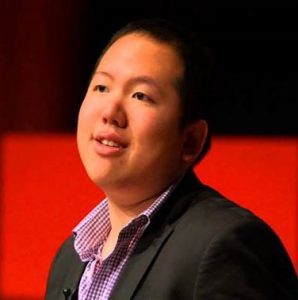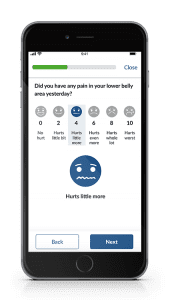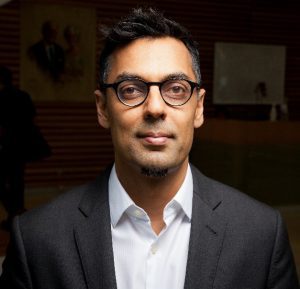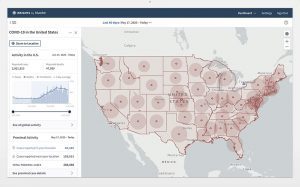The COVID-19 pandemic creates unusual circumstances and atypical needs. Fortunately, startups led by U of T Med alumni are at the ready to meet many of the new requirements.
The pandemic demands accurate forecasting. When will the next outbreak occur? And where? That’s the focus of BlueDot, which Dr. Kamran Khan (9T6) founded. BlueDot is dedicated to strengthening global readiness for dangerous epidemics.
Also, the pandemic generates the need for health care practitioners and patients to interact without meeting face to face. Dr. Joshua Liu (1T3) and his SeamlessMD are effectively meeting that need.
Just a click away
 Dr. Liu is the CEO of SeamlessMD, which provides hospitals across North America with a software platform that allows health care teams to virtually engage, monitor, and connect with patients going through surgery, cancer treatments, or managing a chronic disease. Patients are guided on their smartphone, tablet, or computer with personalized information, step-by-step instructions, and symptom tracking. Health care teams can get alerts and dashboards to monitor patients and catch complications early.
Dr. Liu is the CEO of SeamlessMD, which provides hospitals across North America with a software platform that allows health care teams to virtually engage, monitor, and connect with patients going through surgery, cancer treatments, or managing a chronic disease. Patients are guided on their smartphone, tablet, or computer with personalized information, step-by-step instructions, and symptom tracking. Health care teams can get alerts and dashboards to monitor patients and catch complications early.
The platform reduces the need for in-person consults. Sunnybrook Health Sciences Centre, for example, found that by using SeamlessMD, 35% of their orthopedic surgery patients reported avoiding one or more hospital visits. During the pandemic, Thunder Bay Regional Health Sciences Centre used SeamlessMD to monitor surgical patients and decreased post-op ER visits by 25% even though surgery cases increased by 40%.
The startup also provides remote monitoring for low- and high-risk COVID-19 patients. The software gives patients information about COVID-19 and can survey their symptoms. It ensures that patients know how to self-isolate, what symptoms to look for, and when to go to the hospital. And St. Joseph’s Home Care in Hamilton is using SeamlessMD to monitor their staff for signs of COVID-19.
The idea for SeamlessMD came while Liu was studying medicine at U of T. As part of the program, Liu researched hospital readmissions at University Health Network’s Open Lab. The experience prompted him to ask if digital technology, particularly smartphones and tablets, could be used to monitor patients and reduce the number of patients being discharged from hospital only to be admitted again.
 After teaming up with engineers he met through the U of T affiliated Next 36 business incubator, Liu began playing around with some ideas for a digital patient engagement platform. “When we were just starting out, many of my initial conversations in scoping out the idea were with U of T Medicine faculty and mentors who I had met over the years in my training,” he recalls.
After teaming up with engineers he met through the U of T affiliated Next 36 business incubator, Liu began playing around with some ideas for a digital patient engagement platform. “When we were just starting out, many of my initial conversations in scoping out the idea were with U of T Medicine faculty and mentors who I had met over the years in my training,” he recalls.
Liu’s ideas for virtually connecting patients with their health care team seemed so promising that he decided to skip residency and abandon his dream of becoming a family physician. Instead, he co-founded SeamlessMD and began working full time on the innovative technology.
Today, Liu has no regrets. The startup has 25 full-time employees and plans to hire 15 more by the end of the year. “Our talented team has worked incredibly hard to achieve adoption of a novel technology solution in an ecosystem that is traditionally difficult to innovate in,” he says.
“What I’m most proud of is the positive impact that SeamlessMD has had on patient care locally at organizations such as Michael Garron Hospital in Toronto, all the way to Rush Medical Center in the U.S.”
Especially during the pandemic, SeamlessMD has improved the patient experience by helping them feel connected to their care team. Liu has found that when patients know that the advice they receive is from a member of their own health care team, they’re more likely to follow it. To encourage this compliance, the company adds photos of the hospital’s physicians and other health care providers to the software. Then, for example, when it’s the appropriate time for a person recovering from heart surgery to walk for 30 minutes a day, the advice comes up with a friendly photo of their physician.
The platform also allows patients to monitor their own progress, which the SeamlessMD team has discovered makes them more motivated to recover quickly. Stanford Health Care in California found that using the software for colorectal surgery patients reduced their pain scores by 26%, daily opioid use by 51%, and daily acetaminophen use by 27%.
“Being a U of T Med alumnus continues to create a lot of credibility for the company and gives many of our hospital partners confidence in the solution,” says Liu. “Our hospital partners appreciate knowing that someone with my clinical background has been a key partner in designing our solution and approach from Day 1 of the company’s history.”
Visit SeamlessMD
Our pale blue dot
 In 2013, Dr. Khan founded BlueDot; its name is a metaphor for our small planet. The global early warning system for infectious disease combines the strengths of artificial and human intelligence to track the spread of infectious diseases around the world. It consolidates and analyzes data in 65 languages from news reports, flight data, livestock health statements, and other sources.
In 2013, Dr. Khan founded BlueDot; its name is a metaphor for our small planet. The global early warning system for infectious disease combines the strengths of artificial and human intelligence to track the spread of infectious diseases around the world. It consolidates and analyzes data in 65 languages from news reports, flight data, livestock health statements, and other sources.
A team of experts – including epidemiologists, veterinarians, data scientists, and physicians – then reviews the results. Drs. Isaac Bogoch (0T5) and Alun Ackery (0T8) are on the team as senior medical advisors. They help provide near-real-time intelligence on where a disease is heading to BlueDot’s customers: governments, hospitals, and businesses.
In 2016, BlueDot predicted the spread of the Zika virus to Florida six months before anyone else. And throughout the COVID-19 pandemic, BlueDot has been ahead of the curve, spreading knowledge faster than the virus itself can spread. For instance, it identified India and Brazil as future epicentres months before their case counts began to climb.
Khan’s idea for BlueDot also came while at med school. It was Dr. Jay Keystone (6T9), the late tropical and infectious disease specialist, who sparked Khan’s interest in infectious disease. “I first met Jay when I was a medical student at  Toronto General Hospital,” recalls Khan. “He was an inspiring teacher and a major influence in my decision to pursue a career in infectious diseases.” Another influence was practising on the frontlines of the SARS epidemic.
Toronto General Hospital,” recalls Khan. “He was an inspiring teacher and a major influence in my decision to pursue a career in infectious diseases.” Another influence was practising on the frontlines of the SARS epidemic.
Khan, who is not only the CEO of BlueDot but an infectious disease physician and scientist at St. Michael’s Hospital, warns of more pandemics ahead. “In just the past decade, WHO has declared six public health emergencies from epidemics and pandemics. That translates to an average of one emergency every 20 months!"
“As this pandemic fades into the background, it will be extremely important for us to spend time thinking about how we got here and how each of us might be inadvertently contributing to the emergence and/or spread of dangerous infectious diseases."
"Mother Nature is trying to tell us something,” he says. “Our health is deeply intertwined with other living systems on the planet, and we need to interact with them more gracefully.”
Visit BlueDot
Watch Dr. Khan’s TEDxToronto Talk
